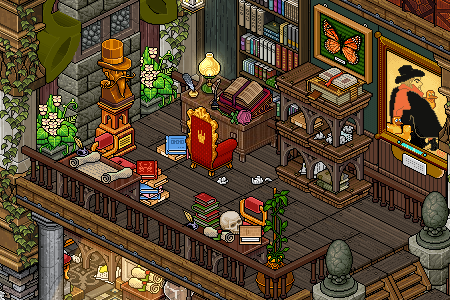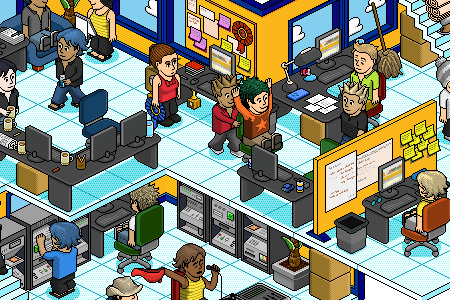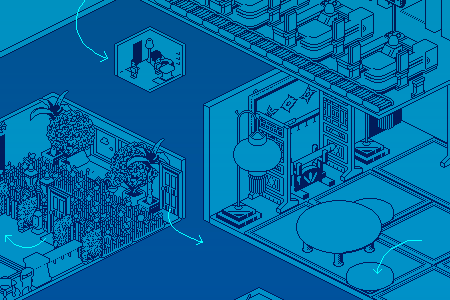Translators dont work rightThey always seems to be wrong but I cant remember why
Results 41 to 50 of 53
-

-

I used this for my french homework teehee

-

That's a nice guide!
Merci!Cya around!
- Shadowz
Put a banana in your ear!
-

Quand? - When
Où - Where
Qu'est-ce - What
Actually, you can use Qu' with a lot of stuff.
-
02-12-2010, 11:52 PM #45
- Join Date
- Oct 2010
- Location
- London
- Posts
- 4,611
- Tokens
- 0
- Habbo
- Conservative,

The bolded bits are the ones I want to correct...
Je suis ennuyeux.
C'est pas de probleme.
Silence!
Kk.
Uhm also...here's some past tense, future tense & perfect tense structure stuff:
Past tense:
ER verbs - take the infinitive (eg; jouer - to play) and knock off the "r" and add an accent to the "e". It becomes joué. To say I have played: J'ai joué (au foot - I have played football).
IR verbs - take the infinitive (eg; finir - to finish) and knock off the "r". You get fini. J'ai fini - I have finished/I finished.
RE verbs - take the infinitive (eg; vendre - to sell) and knock off the "re" and add "u". You get vendu. J'ai vendu - I have sold.
IRREGULAR: The following are irregular and use Je suis followed by the infinitive to make the past tense.
A good way to remember this is DR MRS VANDERTRAMP: Devenir, Revenir, Monter, Rester, Sortir, Venir, Aller, Naître, Descendre, Entrer, Rentrer, Tomber, Retourner, Arriver, Mourir, Partir
They look like this: Je suis tomber - I have fallen.
Present tense:
ER verbs: Take the infinitive and knock off the "r" - Jouer = Je suis joue (I am playing).
IR Verbs: Take the infinitive and knock off the "r" and replace with an "s" - finis = Je suis finis (I am finished).
RE verbs: Take the infinitive and knock off the "re" and replace with an "s" - perdre - Je suis perds (I lose).
Future tense:
Same for all regular verbs:
Je vais + infinitive.
French GCSE A* here I come ;]
DJ Robbie
Former Jobs: Events Organiser, News Reporter, HxHD
-

above poster will never get an a* in french if they think "JE SUIS ENNUYEUX" means "i am bored"
je suis ennuyeux = i am boring
je m'ennuie = i am bored
DON'T LISTEN TO THE VICIOUS AND DECEITFUL LIES OF THE ABOVE POSTER
-
09-03-2012, 01:00 AM #47
 Senior Member
Senior Member

- Join Date
- Feb 2012
- Location
- Edmonton
- Posts
- 1,000
- Tokens
- 0
- Habbo
- fotografia

I know I shouldn't be posting on a thread that is so old but since someone just recently bumped it I thought I'd get a word in before it gets locked. This thread can be helpful for those doing French in school but most of these tips are not very in-tune with actual French as it is spoken in France. That is important to remember and the only way you can ever really get a hang of what an actual French person speaks like is to make a real French friend and start Skyping them or something in French. No, though, please don't take me wrong - there is plenty of wonderful advice in here for those taking French in school (minus the errors made by some so do be careful) but it would be better at the very least to consult some place like WordReference when in doubt where you can get real-time input from native French speakers. I was born just west of Paris and WordReference and other forms of online immersion were what really let me learn English.
Best of luck with your studies and I hope you all come to love French if you don't already! Cheers!
-
14-03-2012, 07:06 PM #48
 Habbox Elite
Habbox Elite


It's because they don't take the differences in languages into context as in the orders of words and stuff.
For example in English we would say "My dad's dog" but in French they say "the dog of my dad". Plus most adjectives are after a noun in French. Basically in French they say different things which are more natural to them and wouldn't sound natural in English and vice versa. Another example is saying you like something "I like watching a film" = "Ce qui j'aime est regarder du film" and the direct translation of that would be "what I like is to watch a film" which doesn't sound natural in English but it what the French are more likely to say.
If anyone has and questions feel free to pm me because I'm doing A2 Level French literature at the moment

-
19-07-2012, 11:43 AM #49
 Habbox Master
Habbox Master

- Join Date
- Jun 2011
- Location
- Lisbon / Edinburgh
- Posts
- 5,651
- Tokens
- 17,995
- Habbo
- LiquidLuck.

This has serious mistakes! Goodbye is ''au revoir'', good evening is ''bonsoir'' and you don't say good night. Welcome is ''bienvenu'', the ''e'' is used if it's for a woman. Happy birthday can also be ''joyeux anniversaire'', which is more used than ''bon anniversaire''. Please is ''s'il te plaît'' if you know the person, ''s'il vous plaît'' if you don't. And every ''ca'' is written ''ça''..
-
19-07-2012, 08:32 PM #50
 Greater Member
Greater Member








 Reply With Quote
Reply With Quote




















